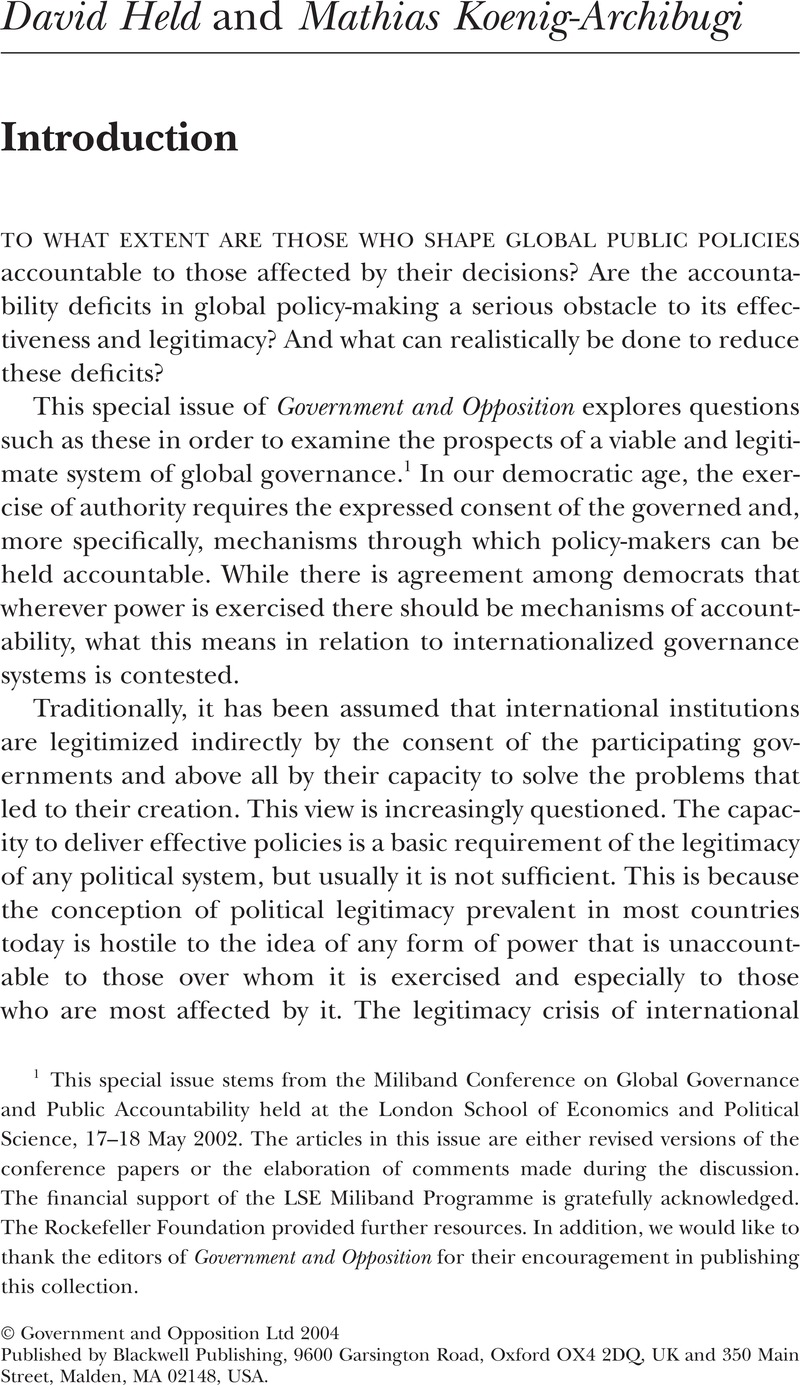Article contents
Introduction
Published online by Cambridge University Press: 28 March 2014
Abstract

- Type
- Articles
- Information
- Copyright
- Copyright © Government and Opposition Ltd 2004
References
1 This special issue stems from the Miliband Conference on Global Governance and Public Accountability held at the London School of Economics and Political Science, 17–18 May 2002. The articles in this issue are either revised versions of the conference papers or the elaboration of comments made during the discussion. The financial support of the LSE Miliband Programme is gratefully acknowledged. The Rockefeller Foundation provided further resources. In addition, we would like to thank the editors of Government and Opposition for their encouragement in publishing this collection.
2 Effectiveness and accountability roughly correspond to what Fritz Scharpf has called output-oriented legitimization and input-oriented legitimization. Fritz Scharpf, Governing in Europe: Effective and Democratic?, Oxford, Oxford University Press, 1999.
3 Edward L. Miles, Arild Underdal, Steinar Andersen, Jorgen Wettestad, Jon Birger Skjaerseth and Elaine M. Carlin, Environmental Regime Effectiveness: Confronting Theory with Evidence, Cambridge, MA, MIT Press, 2001; P. J. Simmons and Chantal de Jounge Oudraat, Managing Global Issues: Lessons Learned, Washington, DC, Carnegie Endowment for International Peace, 2001; Oran R. Young (ed.), The Effectiveness of International Environmental Regimes: Causal Connections and Behavioral Mechanisms, Cambridge, MA, MIT Press, 1999.
4 See for instance Lori Wallach and Michelle Sforza, Whose Trade Organization?: Corporate Globalization and the Erosion of Democracy, Washington, DC, Public Citizen, 1999.
5 James G. March and Johan P. Olsen, Democratic Governance, New York, Free Press, 1995. Robert O. Keohane, ‘Global Governance and Democratic Accountability’, in David Held and Mathias Koenig-Archibugi (eds), Taming Globalization: Frontiers of Governance, Cambridge, Polity Press, 2002.
6 David Held and Anthony McGrew (eds), Governing Globalization: Power, Authority, and Global Governance, Cambridge, Polity Press, 2002.
7 David Held, Anthony McGrew, David Goldblatt and Jonathan Perraton, Global Transformations: Politics, Economics and Culture, Cambridge, Polity Press, 1999.
8 Judith L. Goldstein, Miles Kahler, Robert O. Keohane and Anne-Marie Slaughter (eds), Legalization and World Politics, Cambridge, MA, MIT Press, 2001; Oran R. Young, Governance in World Affairs, Ithaca, NY, Cornell University Press, 1999.
9 Abbott, Kenneth W. and Snidal, Duncan, ‘Why States Act Through Formal International Organizations’, Journal of Conflict Resolution, 42 (1998), pp. 3–32;CrossRefGoogle Scholar Bob Reinalda and Bertjan Verbeek (eds), Autonomous Policymaking by International Organizations, London, Routledge, 1998.
10 Anne-Marie Slaughter, ‘Governing the Global Economy Through Government Networks’, in Michael Byers (ed.), The Role of Law in International Politics, Oxford, Oxford University Press, 2000.
11 Virginia Haufler, A Public Role for the Private Sector: Industry Self-Regulation in a Global Economy, Washington, DC, Carnegie Endowment for International Peace, 2001; John Braithwaite and Peter Drahos, Global Business Regulation, Cambridge, Cambridge University Press, 2000; Karsten Ronit and Volker Schneider (eds), Private Organisations in Global Politics, London, Routledge, 2000.
12 Global Civil Society Yearbook, Oxford, Oxford University Press, 2001, 2002, 2003; Margaret E. Keck and Kathryn Sikkink, Activists Beyond Borders: Advocacy Networks in International Politics, Ithaca and London, Cornell University Press, 1998; Robert O’Brien, Anne-Marie Goetz, Jan Aart Scholte and Marc Williams, Contesting Global Governance: Multilateral Economic Institutions and Global Social Movements, Cambridge, Cambridge University Press, 2000.
13 Wolfgang H. Reinicke et al., Critical Choices: The United Nations, Networks, and the Future of Global Governance, Ottawa, International Development Research Centre, 2000; John G. Ruggie, ‘Taking Embedded Liberalism Global: the Corporate Connection’, in Held and Koenig-Archibugi, Taming Globalization, op. cit.
- 19
- Cited by


